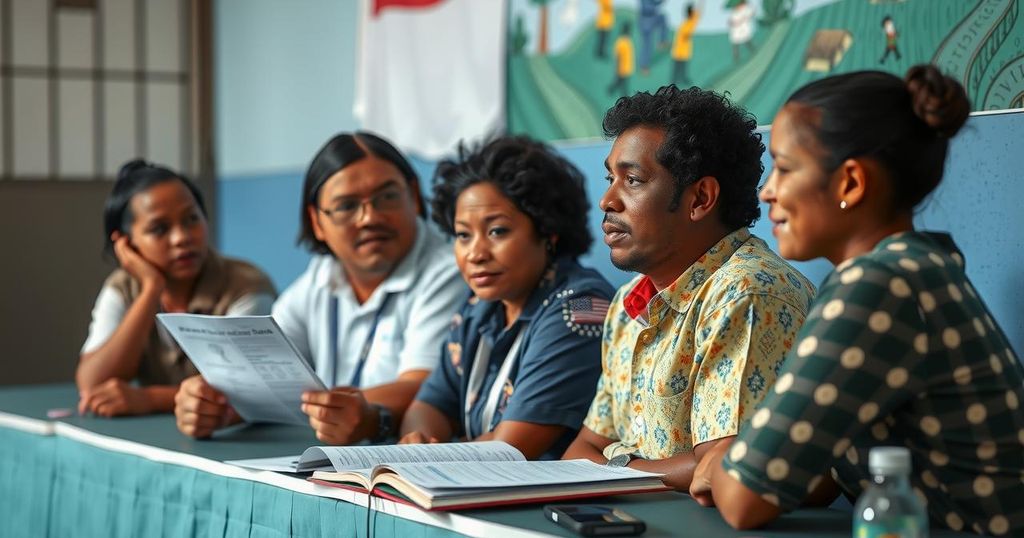Nicaragua’s Constitutional Changes: A Step Towards Authoritarian Control Over Media

Nicaragua plans to enact constitutional reforms that would enhance presidential power and state control over media, similar to measures in authoritarian nations like Cuba and Venezuela. The reforms aim to restrict media independence, impose severe penalties for misinformation, and expand government authority, drawing widespread criticism from human rights advocates. Key figures, including Carlos Jornet and Lucia Pineda Ubau, highlight the risks to free speech and journalism in the region.
Nicaragua is poised to adopt a constitutional reform that would bolster presidential authority and enhance state control over media by January. This reform mandates that media outlets and platforms operate free of foreign influence and restrict the dissemination of so-called “false news.” Observers have drawn parallels between this impending legislation and similar measures enacted in other authoritarian regimes, such as those in Cuba and Venezuela, which have historically undermined media independence and free expression.
Carlos Jornet, the president of the freedom of the press and information committee for the Inter American Association, has highlighted a concerning trend of free speech suppression throughout the Americas, particularly in regards to social media and internet platforms. “Worse still, the governments promoting such controls do so after having co-opted the judiciary, the legislature, and all oversight bodies,” stated Jornet, emphasizing the bleak situation for free speech. He also noted, “It is clear that when the government labels information as false, there will be no possibility to exercise a defense or argue about the veracity of a complaint or the relevance of an opinion.”
This reform, initially approved in November, requires a second vote for ratification. Among its provisions, it seeks to extend President Daniel Ortega’s term from five years to six, designating his wife, Rosario Murillo, as “co-president.” This consolidation of power is aimed at further fortifying Ortega’s regime amidst a backdrop of heightened police and military authority, permitting him to tighten control over Nicaragua.
Critics assert that the constitutional amendments legitimize what they perceive as Ortega’s “absolute power” alongside Murillo. However, Gustavo Porras, head of the Nicaraguan legislature, dismissed opposition as misguided, asserting that the reform would undoubtedly pass.
Lucia Pineda Ubau, director of 100% Noticias, has warned that the constitutional reform will facilitate government targeting of independent journalism, framing it as part of a broader climate of repression against the media. She noted, “This is serious because it includes it in the constitution policy, which continues to punish, persecute and criminalize journalists and the media.”
The reform also proposes severe penalties, increasing prison sentences from 10 to 15 years for spreading false information deemed to incite panic or unrest, and extending its reach beyond Nicaragua. \nAs this legal framework unfolds, it reflects legislative patterns seen in authoritarian regimes elsewhere, such as Venezuela, where repressive measures have decimated independent journalistic endeavors, and Cuba, which has introduced strict laws governing freedom of expression.
Experts point to Cuba’s punitive legal structures, which similarly permit extensive government control over online commentary and allow arbitrary charges against dissenters. The United Nations High Commissioner for Human Rights, Volker Türk, warned of the drastic consequences of the Nicaraguan amendments, stating that if adopted, they would signal a substantial deterioration of fundamental rights and the rule of law in the nation.
The article discusses Nicaragua’s imminent constitutional reforms aimed at increasing presidential power and controlling media. This situation mirrors historical legislative practices in authoritarian countries like Cuba and Venezuela, where government crackdowns on free speech are prevalent. Such measures undermine democratic principles, posing significant threats to journalism and civil liberties. The narrative highlights various perspectives from human rights advocates and officials, focusing on the alarming trend of media repression in Latin America.
The proposed amendments to Nicaragua’s constitution signify a grave expansion of executive authority and a direct assault on media freedom. Drawing parallels with authoritarian regimes in the region, the reform could redefine the landscape of journalistic expression and public discourse in Nicaragua. The international community must remain vigilant in monitoring these developments, as they have profound implications for human rights and democratic governance in the country.
Original Source: www.voanews.com







